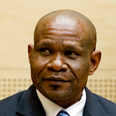
Ngudjolo Chui
Photo: AP
The International Criminal Court
(ICC) acquitted Congolese warlord Ngudjolo Chui of all charges of war crimes and crimes against humanity
on Tuesday, a blow for victims of Congo
wars a decade ago.
Related Stories
- PA threatens ICC action over settlement plans
- ICC says has no jurisdiction over territories
- Migrants fearful after rally
The verdict, only the second in the war crimes court's 10-year history, and its first acquittal, is a setback for the ICC's prosecutors who judges said had failed to link Ngudjolo to atrocities in north-eastern Congo in 2003.
Prosecutors had accused Ngudjolo of directing militias to kill, pillage and rape during a conflict in the mineral-rich Ituri province of Congo in 2003.
Prosecutors said Ngudjolo directed fighters to block roads to and from the village of Bogoro in February 2003 in order to kill civilians attempting to flee and that civilians, including women and small children were burned alive inside their homes.
Two hundred people were killed during and after the attack on the village, the prosecutors said, when ethnic Lendu and Ngiti fighters allegedly destroyed the homes of the village's mainly Hema inhabitants.
The conflict was part of a wider war in eastern Congo.
Reasonable doubt
The ICC judges stressed that atrocities had been committed during the conflict, but said prosecutors had failed to prove beyond all reasonable doubt that Ngudjolo was behind them.
"This does not in any way throw into question what befell the people of that area on that day," presiding judge Bruno Cotte said.
The decision to acquit did not necessarily mean judges were convinced of his innocence, he said.
Jean-Pierre Kilenda Kakengi Basila, Ngudjolo's lawyer, said the ruling proved the court's independence.
"Any other verdict would have astonished us. Judges have shown that this is a court that applies the law," he said.
Thomas Lubanga, the court's first convict, was sentenced to 14 years earlier this year for his role on another side that participated in the same conflict.
"Lubanga was a Hema leader, and the acquittal of a Ngudjolo, a Lendu, just after the conviction of a Hema could exacerbate tension between the two ethnicities in Ituri," Jennifer Easterday of the Open Society Justice Initiative said.
Pressed by judges, Fatou Bensouda, the court's chief prosecutor, applied to have Ngudjolo held in detention pending an appeal. Judges will rule on this request later today.
Judges are expected to rule on the guilt of Germain Katanga, Ngudjolo's more prominent co-accused, next year.















